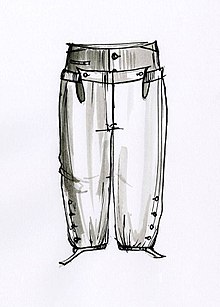breech
Appearance
See also: breach
English
[edit]Etymology
[edit]From Middle English breche, from Old English brēċ, from Proto-Germanic *brōkiz pl, from Proto-Germanic *brōks (“clothing for loins and thighs”). Cognate with Dutch broek, Alemannic German Bruech, Swedish brok. Doublet of vraka.
Pronunciation
[edit]- (UK, General American) IPA(key): /bɹiːt͡ʃ/
Audio (Southern England): (file) - Rhymes: -iːtʃ
- Homophone: breach

Noun
[edit]breech (countable and uncountable, plural breeches)
- (historical, now only in the plural or attributive) A garment whose purpose is to cover or clothe the buttocks. [from 11th c.]
- 1992, Tamora Pierce, Wild Magic, New York, N.Y.: Atheneum Books for Young Readers, →ISBN, page 57:
- The stallion lipped Alanna’s breech pockets. “He’s spoiled rotten.” Fishing a lump of sugar out, she fed it to him.
- 2009, John C[oyne] McManus, American Courage, American Carnage: 7th Infantry Chronicles: The 7th Infantry Regiment’s Combat Experience, 1812 Through World War II, New York, N.Y.: Forge, →ISBN, pages 244–245:
- The typical American combat soldier in World War I wore an olive-drab tunic, stiff at the neck, breech-style trousers, and combat shoes with canvas leggings or, preferably, wrappings.
- (now rare) The buttocks or backside. [from 16th c.]
- 1624, John Smith, Generall Historie, Kupperman, published 1988, page 157:
- And he made a woman for playing the whore, sit upon a great stone, on her bare breech twenty-foure houres, onely with corne and water, every three dayes, till nine dayes were past […]
- 1736, Alexander Pope, Bounce to Fop:
- When pamper'd Cupids, bestly Veni's, / And motly, squinting Harvequini's, / Shall lick no more their Lady's Br—, / But die of Looseness, Claps, or Itch; / Fair Thames from either ecchoing Shoare / Shall hear, and dread my manly Roar.
- 1749, Henry Fielding, chapter VIII, in The History of Tom Jones, a Foundling, volume (please specify |volume=I to VI), London: A[ndrew] Millar, […], →OCLC, book III:
- "Oho!" says Thwackum, "you will not! then I will have it out of your br—h;" that being the place to which he always applied for information on every doubtful occasion.
- (firearms) The part of a cannon or other firearm behind the chamber. [from 16th c.]
- Coordinate term: muzzle
- (nautical) The external angle of knee timber, the inside of which is called the throat.
- (obstetrics) A breech birth.
Derived terms
[edit]Translations
[edit]Garment that clothes the buttocks
|
buttocks, backside
|
part of a cannon or other firearm
|
birth
|
Adverb
[edit]breech (not comparable)
- (obstetrics, of birth) With the hips coming out before the head.
Derived terms
[edit]Adjective
[edit]breech (not comparable)
- (obstetrics) Born, or having been born, breech.
Translations
[edit]Born, or having been born, breech
|
Verb
[edit]breech (third-person singular simple present breeches, present participle breeching, simple past and past participle breeched)
- (dated, transitive) To dress in breeches. (especially) To dress a boy in breeches or trousers for the first time (the breeching ceremony).
- 1748-1832, Jeremy Bentham, The Works of Jeremy Bentham, Volume 10:
- […] it occurred before I was breeched, and I was breeched at three years and a quarter old;
- 1849–1861, Thomas Babington Macaulay, chapter X, in The History of England from the Accession of James the Second, volume (please specify |volume=I to V), London: Longman, Brown, Green, and Longmans, →OCLC:
- A great man […] anxious to know whether the blacksmith's youngest boy was breeched.
- 1748-1832, Jeremy Bentham, The Works of Jeremy Bentham, Volume 10:
- (dated, transitive) To beat or spank on the buttocks.
- (transitive) To fit or furnish with a breech.
- to breech a gun
- (transitive) To fasten with breeching.
- (poetic, transitive, obsolete) To cover as if with breeches.
- c. 1606 (date written), William Shakespeare, “The Tragedie of Macbeth”, in Mr. William Shakespeares Comedies, Histories, & Tragedies […] (First Folio), London: […] Isaac Iaggard, and Ed[ward] Blount, published 1623, →OCLC, [Act II, scene iii]:
- Their daggers unmannerly breeched with gore.
Derived terms
[edit](Terms derived from the adjective, adverb, or noun breech):
Translations
[edit]to dress in breeches
|
See also
[edit]Further reading
[edit]Anagrams
[edit]Categories:
- English terms inherited from Middle English
- English terms derived from Middle English
- English terms inherited from Old English
- English terms derived from Old English
- English terms inherited from Proto-Germanic
- English terms derived from Proto-Germanic
- English doublets
- English 1-syllable words
- English terms with IPA pronunciation
- English terms with audio pronunciation
- Rhymes:English/iːtʃ
- Rhymes:English/iːtʃ/1 syllable
- English terms with homophones
- English lemmas
- English nouns
- English uncountable nouns
- English countable nouns
- English terms with historical senses
- English terms with quotations
- English terms with rare senses
- en:Firearms
- en:Nautical
- en:Obstetrics
- English adverbs
- English uncomparable adverbs
- English adjectives
- English uncomparable adjectives
- English verbs
- English dated terms
- English transitive verbs
- English terms with collocations
- English poetic terms
- English terms with obsolete senses
- English terms derived from the Proto-Indo-European root *bʰreg-
- en:Buttocks
